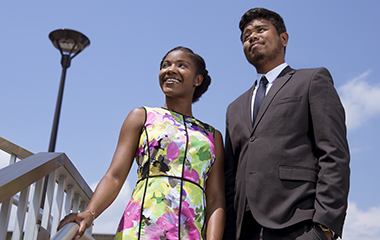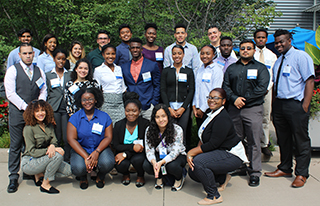A Springboard to Success
 |
|
Akua Williams and Matthew Brandon were among the CSTEP students who worked with faculty mentors conducting undergraduate research this summer. (Photo by Carlo de Jesus) |
ALBANY, N.Y. (Aug. 21, 2017) – Akua Williams, Matthew Brandon and their fellow students in UAlbany’s Collegiate Science & Technology Entry Program (CSTEP) are getting a jump start on learning how to conduct research.
They were among the 16 UAlbany students and six undergrads from other colleges offering final oral presentations Aug. 3 and 4 in LC 20 through the University at Albany Summer Research Program.
For Akua (pronounced A-KWE-ya), the topic was a comparison of international sex trafficking techniques. In the U.S., victimized girls and young women range in age from 9 to 19. The average age is 11, she said.
Akua, a senior who was born in the South Bronx and lives in Middletown, N.Y., is a member of the women’s track and field team.
She credits her faculty mentor, political scientist Irina Chindea with guiding her as she learned how to conduct undergraduate research.
“She is by far one of the biggest inspirations and motivators I’ve ever come across during my time at the University,” she said of Chindea, a visiting assistant professor at UAlbany’s Rockefeller College of Public Affairs and Policy.
While most of the research presented by CSTEP students was distinctly STEM-centered, the presentations covered a wide range of topics, from an analysis of suicide attempts and suicide among veterans, to regulation of Zika RNA genome conformations.
 |
|
CSTEP and LSAMP (Louis Stokes Alliance for Minority Participation) students presented their research on STEM and licensed profession fields July 27-29 at the McNair Conference in Buffalo, N.Y. (Photo by Sabrina Fernandez) |
Origin of CSTEP
CSTEP, created by the New York State Legislature, is funded by the state Department of Education, and provides services to undergrads and graduate students in the STEM and licensed professions. In addition to research opportunities, those services include: career and personal counseling, tutoring, study groups, math and writing labs, and information on graduate schools and the licensed professions. Students must be historically underrepresented and/or economically disadvantaged.
According to Akua, “The best thing about CSTEP is that no matter if you’re in the office once a day or once a month, you’re a part of CSTEP. You are a part of a family and family cannot be measured.”
Mayra Santiago serves as interim director of the Office of Access and Academic Enrichment (OAAE) and oversees UAlbany’s CSTEP among other programs. Program Coordinator is Collina Cooke. CSTEP is located in OAAE in Li 94V.
“CSTEP is a program that helps underrepresented and economically disadvantaged students achieve goals that many of them never thought were possible,” Cooke said. “I enjoy watching students mature academically and professionally as they strive for academic success. I am proud of the 2017 University at Albany Summer Research Program cohort as they have worked hard to complete their research. It has truly been an amazing summer and I look forward to seeing all of the amazing things that they accomplish in the future.”
During the Summer Research Program, students work for eight weeks with a faculty mentor conducting intensive research during the day, and live at Indian Quad with their peers in the program.
CSTEP is a year-round program. Earlier this year, the UAlbany CSTEP took home two first-place trophies at the 25th Annual CSTEP Statewide Student Conference hosted at the Sagamore on Lake George. Out of the five students chosen to present, UAlbany students Magdalis Mendoza and Denisse Duran-Reyes won both oral and poster presentations in their categories.
Akua’s career goal is to work for a federal agency, investigating crimes like human trafficking, hate crimes and drug trafficking.
“In working for a federal agency, I must learn how to analyze investigative research that I have to collect,” she said. “I must learn how to understand all fundamentals behind a crime. Presenting an oral presentation is relevant in my career because I can practice briefing colleagues about a case we are working on, delivering it in an informative and concise manner.”
Fellow CSTEP student Matthew Brandon’s presentation was A Computer Model for the Brain. His faculty mentor is Annalisa Scimemi, assistant professor in Biological Sciences. Matthew, a computer science major, said his project gave him the chance to cross disciplines and immerse himself in biology.
Matthew, who was born in Georgetown, Guyana, and now lives in Queens, is a junior whose goal is to be a software engineer and software developer. He’d like to create his own start-up company.
“I believe that research is essential to my academic success because it broadens my horizons,” Matthew said. “Most people in computer science usually go in for internships that have hands-on experience at tech companies, where they learn how to work in the field. In my case, I conducted research where neurology and computer science overlapped.”
He said the experience gives him a leg up on the competition when looking for a future job.
![]() For more news, subscribe to UAlbany's RSS headline feeds
For more news, subscribe to UAlbany's RSS headline feeds
A comprehensive public research university, the University at Albany-SUNY offers more than 120 undergraduate majors and minors and 125 master's, doctoral and graduate certificate programs. UAlbany is a leader among all New York State colleges and universities in such diverse fields as atmospheric and environmental sciences, business, education, public health,health sciences, criminal justice, emergency preparedness, engineering and applied sciences, informatics, public administration, social welfare and sociology, taught by an extensive roster of faculty experts. It also offers expanded academic and research opportunities for students through an affiliation with Albany Law School. With a curriculum enhanced by 600 study-abroad opportunities, UAlbany launches great careers.


